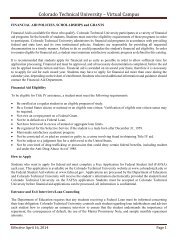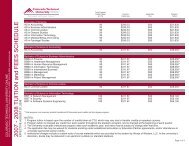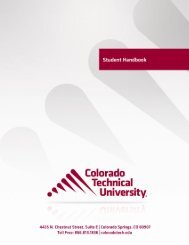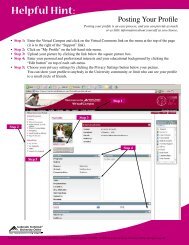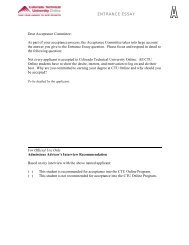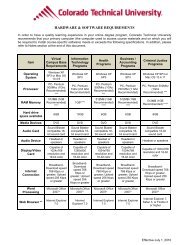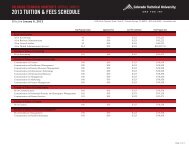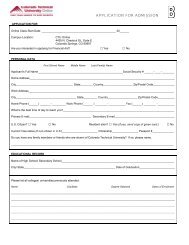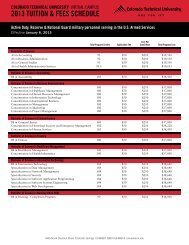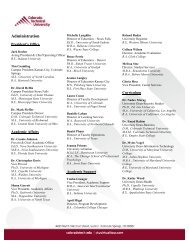Appendix D â Drug and Alcohol Abuse Prevention Information - CTU
Appendix D â Drug and Alcohol Abuse Prevention Information - CTU
Appendix D â Drug and Alcohol Abuse Prevention Information - CTU
Create successful ePaper yourself
Turn your PDF publications into a flip-book with our unique Google optimized e-Paper software.
Colorado Technical University- Virtual Campus<br />
<strong>Drug</strong> <strong>and</strong> <strong>Alcohol</strong> <strong>Abuse</strong> <strong>Prevention</strong> <strong>Information</strong><br />
In accordance with the requirements of the <strong>Drug</strong>-Free Schools <strong>and</strong> Communities Act<br />
of 1989 (Public Law 101-226), <strong>and</strong> the <strong>Drug</strong>-Free Workplace Act of 1988 (Public Law<br />
101-690), our school provides all students <strong>and</strong> employees with the following<br />
information concerning school policies <strong>and</strong> the consequences of the manufacture,<br />
distribution, possession, or use of illicit drugs or alcohol.<br />
Students <strong>and</strong> employees are prohibited from the unlawfully manufacturing,<br />
distributing, possessing, or using illicit drugs or alcohol while on school property or<br />
participating in any school activity. Violation of this policy will subject students or<br />
employees to disciplinary action up to <strong>and</strong> including expulsion or termination from<br />
employment. In addition, violation may result in local, state, <strong>and</strong>/or federal criminal<br />
charges.<br />
Legal sanctions under local, state, <strong>and</strong> federal laws may include:<br />
suspension, revocation, or denial of a driver's license<br />
loss of eligibility for federal financial aid or other federal benefits<br />
property seizure<br />
m<strong>and</strong>ated community service<br />
felony conviction that may result in 20-50 years imprisonment at hard labor<br />
without benefit of parole<br />
monetary fines<br />
In addition to local <strong>and</strong> state authorities, the federal government has four agencies (the<br />
<strong>Drug</strong> Enforcement Agency, U.S. Customs Service, Federal Bureau of Investigation,<br />
<strong>and</strong> the U.S. Coast Guard) engaged in combating illicit drugs. One should be aware<br />
that:<br />
it is a crime to hold someone else's illicit drugs<br />
it is a crime to sell fake "dope"<br />
it is a crime for being in a house where people are using illicit drugs, even if<br />
you are not using them<br />
it is a crime if drugs are in your locker, car, purse, or house which is considered<br />
"constructive possession"
<strong>Drug</strong> abuse, which can affect ones physical <strong>and</strong> emotional health <strong>and</strong> social life, is the<br />
utilization of natural <strong>and</strong>/or synthetic chemical substances for non-medical reasons to<br />
affect the body <strong>and</strong> its processes, the mind <strong>and</strong> nervous system <strong>and</strong> behavior. <strong>Drug</strong>s<br />
can be highly addictive <strong>and</strong> injurious to the body. Among the manifestations may be<br />
loss of sense of responsibility <strong>and</strong> coordination, restlessness, irritability, anxiety,<br />
paranoia, depression, acting slow-moving, inattentiveness, loss of appetite, sexual<br />
indifference, coma, convulsions, <strong>and</strong> death.<br />
There are classic danger signals that could be indicative of drug use. These danger<br />
signals include:<br />
abrupt changes in mood or attitude<br />
continuing slump at work or school<br />
continuing resistance to discipline at work or school<br />
cannot get along with family or friends<br />
unusual temper flare-ups<br />
increased borrowing of money<br />
heightened secrecy<br />
a complete new set of friends<br />
<strong>Information</strong> regarding the effects of commonly abused drugs may be found on the<br />
internet at www.nida.nih.gov/<strong>Drug</strong>sof<strong>Abuse</strong>.html .<br />
<strong>Drug</strong> <strong>and</strong> alcohol abuse education programs are offered by local community agencies.<br />
The school will post information about such education programs in the Student<br />
H<strong>and</strong>book.<br />
While care must be taken to ensure that a person is not wrongly accused of drug use, it<br />
is recommended that anyone who notes danger signals in either a student or employee<br />
contact the school President’s Office. If it is determined by the school President that a<br />
student or employee is in need of assistance to overcome a drug problem, he/she may<br />
be counseled on the need to seek assistance. The cost of such assistance or treatment<br />
will be the responsibility of the student or employee. Records of such counseling will<br />
remain confidential.<br />
In certain instances, students <strong>and</strong> employees may be referred to counseling <strong>and</strong>/or a<br />
substance abuse help center. If such a referral is made, continued enrollment or<br />
employment is contingent upon attendance <strong>and</strong> successful completion of any<br />
prescribed counseling or treatment. Students or employees who are seeking treatment<br />
for a substance abuse problem may contact the President’s Office. Confidentiality will<br />
be maintained. In addition, students or employees who believe they have a substance<br />
abuse problem may find sources of treatment or advice by referring to the section of
the local telephone book headed "<strong>Drug</strong> <strong>Abuse</strong> & Addiction <strong>Information</strong> <strong>and</strong><br />
Treatment."<br />
There are also national organizations that may be contacted for help, such as:<br />
The <strong>Alcohol</strong>ism <strong>and</strong> <strong>Drug</strong> <strong>Abuse</strong> Hotline 1-800-ALCOHOL (1-800-252-6465)<br />
National <strong>Drug</strong> <strong>Abuse</strong> Helpline 1-866-874-4553<br />
The National Institute on <strong>Drug</strong> <strong>Abuse</strong> Treatment Referral Hotline 1-800-662-<br />
HELP (4357) or http://findtreatment.samhsa.gov/<br />
Al-Anon for Families of <strong>Alcohol</strong>ics 1-800-344-2666<br />
Student <strong>and</strong> employees must notify the school President, in writing, within five days<br />
of being convicted of a criminal drug statute at the school. Disciplinary action will<br />
occur within 30 days of receipt of the written notification <strong>and</strong> may range from a letter<br />
of admonishment to termination from enrollment or employment at the school.<br />
6/11



